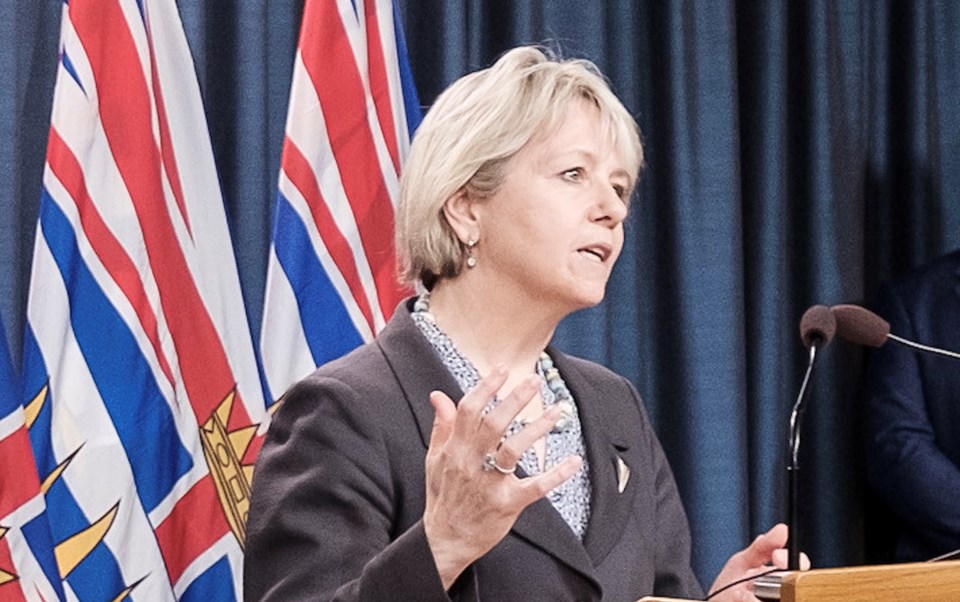On the one-year anniversary of the World Health Organization declaring that the spread of COVID-19 constitutes a global pandemic, B.C. continues to show evidence that the virus is not yet under control.
Another 569 people were diagnosed as having the virus in the past day, for a total of 86,219 since the first case in B.C. was detected in January 2020. More than 92.5% of those who have been infected, or 79,829 individuals, have recovered.
There are 51 more people actively battling infections today, compared with yesterday, for a total of 4,912 – the highest number since January 12, more than eight weeks ago, when there were 5,045 such people The vast majority of those with active infections have been told to self-isolate, although 244 are in hospitals, with 68 of those sick enough to be in intensive care units.
Despite this news, provincial health officer Bonnie Henry made a .
"The provincial health officer order on gatherings and events has been amended to allow for outdoor gathering for up to 10 people," she said. "This means your children can have a play-date with their friends for the March Break, but with their same group of friends, and if they're in school, the group of friends that they're in a cohort. So, you can meet friends outside and have a coffee, have a chance to have a connection, have a picnic in the park with your with your grandparents."
Sleep-over parties, Henry said, remain banned.
"We know that outdoors is safer than indoors," she said.
Henry also tightened restrictions on alcohol service for St. Patrick's Day.
She amended her order for food and liquor service establishments "so that liquor sales for on-site, and off-site consumption must cease between 8 p.m. on March 17 until 9 a.m. on March 18th."
She said there will be "some caveats around full meal provision," and when restaurants must close, similar to restrictions put in place for New Year's Eve.
Her advice not to travel around the province remains unchanged, she said. While it would be OK for someone to travel in their car to their cabin and remain self-contained, it would not be OK for someone to travel to a different community to stay in a hotel, dine at restaurants with others and otherwise tour around, according to her advice.
With three more people dying from the virus in the past day, B.C.'s death toll from COVID-19 has risen to 1,397.
Health officials are also monitoring more than 8,900 people for symptoms because they have had known exposure to people identified as being infected, said provincial health officer Bonnie Henry in a media briefing. She did not disclose the exact number.
Provincial data shows that 366,791 doses of vaccine have been provided to 279,782 people in B.C., with 87,009 people having had a second dose.
Most of Henry's time at the March 11 press conference was spent describing in detail a series of charts showing the spread of the virus to put the spread in context since the start of the pandemic.
One chart that Henry has not shown in the past was one outlining the top 15 causes of death in B.C. While the chart did not contain raw numbers, it showed that COVID-19 was the eighth highest cause of death in the province in 2020 despite the public health orders put in place to reduce spread.
Malignant cancers were the biggest cause of death in B.C. last year. That was followed by heart diseases, stroke, diabetes, illicit drug toxicity, lower respiratory diseases and Alzheimer's disease, according to the chart.
The average age of those who died from COVID-19 in B.C. in 2020 was 86.
Here is the breakdown of where the 569 newly infected people reside, by health region:
• 140 in Vancouver Coastal Health (24.6%);
• 301 in Fraser Health (52.9%);
• 41 in Island Health (7.2%);
• 26 in Interior Health (4.6%);
• 60 in Northern Health (10.5%); and
• one person who resides outside Canada.
None of the nine active outbreaks at seniors' homes is in the Vancouver Coastal Health region or Island Health regions.
The five active outbreaks at seniors' living facilities in Fraser Health are:
• Chartwell Carrington House in Mission;
• Fleetwood Place in Surrey;
• Holmberg House Hospice in Abbotsford;
• Revera Sunwood in Maple Ridge; and
• Shaughnessy Care Centre in Port Coquitlam.
The only outbreak at such a facility in the Northern Health region is at the Acropolis Manor in Prince Rupert.
The three active outbreaks at seniors' living facilities in Interior Health are:
• Brocklehurst Gemstone Care Centre in Kamloops,
• The Florentine in Merritt; and
• Cottonwoods Care Centre in Kelowna.
There are also eight active COVID-19 outbreaks at B.C. hospitals. They include:
• Chilliwack General Hospital in Chilliwack;
• Dawson Creek and District Hospital in Dawson Creek;
• Eagle Ridge Hospital in Port Moody;
• Kelowna General Hospital in Kelowna;
• Mission Memorial Hospital in Mission;
• Royal Columbian Hospital in New Westminster;
• Surrey Memorial Hospital in Surrey; and
• Vancouver General Hospital in Vancouver.


-thumb.png;w=120;h=80;mode=crop)
